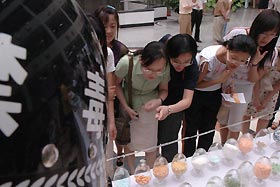|
China's anti-drug forces hit ice hard
By Wu Chong (China Daily)
Updated: 2005-06-21 23:00
KUNMING: China's anti-drug frontier, Yunnan Province, said it had witnessed a
dangerous surge in "ice" trafficking in the first five months of this year.
 |
| College students watch attentively
at samples on an anti-drug exhibition in a college in the
Northeast Heilongjiang Province on June 20, 2005.
[newsphoto] |
Between January and May province authorities seized 62.1 per cent more
methamphetamine, or "ice," than in the same period last year, the local
narcotics control commission said on Monday.
By comparison, the amount of heroin seized fell by 28.5 per cent during the
same period year-on-year.
Despite the fall, heroin still accounts for most of the drug trafficking in
Yunnan, which borders the infamous Golden Triangle where Thailand, Myanmar and
Laos meet.
"Making ice from chemicals takes less effort than growing poppies to extract
heroin," said Sun Dahong, secretary-general of the Yunnan Provincial Narcotics
Control Commission. "Plus, a large number of Chinese youngsters think ice is
less addictive and can be easier to quit than heroin. They provide a large
market for ice traffickers."
Also, an increasing outflow of precursor chemicals being shipped from
Guangdong, Zhejiang and Fujian provinces via Yunnan into neighbouring drug
producers in the Golden Triangle has raised the production of ice, which is
afterwards smuggled back into China through Yunnan, he added.
The local drug-control watchdog said that since March it has cracked down on
ice trafficking in local public entertainment places such as nightclubs. A new
regulation issued in March says that businesses where drug dealing is found will
be forever deprived of operating licences.
"We will step up efforts to curb the smuggling of precursor chemicals as well
as increasing education for young people about the dangers of ice," Sun said.
Yunnan has handled 151,000 cases and seized 131.7 tons of drugs, mostly
heroin, since 1982, when it established its professional anti-drug squad.
Last year, it seized more than 10 tons of drugs, its biggest-ever haul for a
single year.
68,000 drug abusers
A provincial investigation last year showed the province had more than 68,000
drug abusers, accounting for 8.6 per cent of the total registered nationwide.
"Most illegal drugs in Yunnan are trafficked from bordering countries, by
people operating beyond our reach," Sun said.
"That has become the biggest challenge for the province's control of
narcotics."
Statistics show about 80 per cent of the heroin in China is smuggled from the
Golden Triangle area.
The province is strongly recommending that as well as continuous
multi-national co-operation against drug trafficking, neighbouring countries
should make a stronger commitment to eradicating the cultivation of drug crops
such as opium poppies and marijuana.
"We have had a promise from the United Wa State Army in Myanmar to prohibit
the cultivation of poppies from June 26," Sun said.
"We did a field investigation there and feel optimistic. But whether the
prohibition can stand in the long term is still a question."
In the past 25 years, Yunnan has dedicated 500 million yuan (US$60 million)
to helping former drug producers along the border develop alternative crops,
providing farmers with 4 hectares for legal produce.
"Nearly 3 hectares of opium poppies could have produced about 40 tons of
heroin, almost equal to the total quantity of drugs we seized between 2001 and
2004," Sun said.
However, he added, poppies are still grown in 6 hectares near the border
areas.
(China Daily 06/22/2005 page2)
|